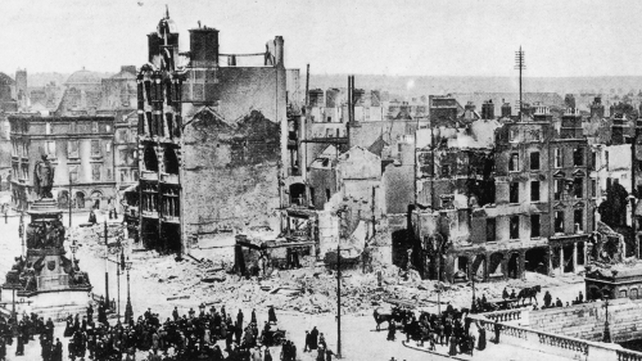1916: It’s complicated
The Easter Rising of 1916 was commemorated in Dublin yesterday and today upon its centenary. Yesterday, "hundreds of thousands of people lined the streets of Dublin for the largest public spectacle in the history of the State,” one newspaper said.
Commemorated, not celebrated, mind you. There’s a great deal of ambivalence about the Rising. I’ve read several articles and watched two TV shows and I’m still trying to get my head around it. Cliff’s Notes: Ireland was England’s first colony, allowing exploitation of the land and people by the landed gentry, who either relocated from Great Britain to the Emerald Isle or hired local rent collectors to hoover up money and send it back to estates in England (think Downton Abby--many of these estates were financed by Irish labourers). By 1916, the Irish were getting closer to a Home Rule bill, devolving power to locally elected representatives (rather than English parliamentarians). This alarmed the majority-Protestant counties of the north, which raised up the Ulster Volunteer Force. The southern counties responded with the Irish Volunteer Force. As civil war seemed imminent, the First World War broke out and talk of Home Rule was sidelined.
Within the IVF was a hard line faction that saw WWI as an opportunity to take on an encumbered Britain. While many in the IVF and UVF went to fight and die in the Somme and other bloodbaths, some at home were forming alliances with the very Germans Britain was fighting, trying to obtain weapons from the enemy of my enemy. Britain intercepted a German shipment of arms, yet those plotting the Easter Rising decided to go ahead. The head of the IVF called off a planned rally when he got wind of it, but the militia within the IVF regrouped and attacked British soldiers on Easter Sunday.
It was a ragtag group of snipers who picked off British soldiers by the dozens.

Britain responded thusly, heavily bombing the city:

The 1916 rebels did not have support from the majority of Dubliners, who were impoverished and were more worried about where their next meal was coming from than taking on the world’s greatest imperial power. Dubliners were angry at the rebels for the 100s of civilians who died in the short-lived rebellion and at the widespread destruction of their city, followed by Marshall Law.
But then... the British went on to execute the leaders of the Easter Rising, one of whom had been wounded in battle and was tied to a chair to be shot. Then the Brits rounded up 3,000 suspected sympathisers and sent them to jail in Wales, where they learned that Welsh was still spoken (the English had banned Gaelic).

These actions turned Irish public opinion in favour of the rebels, leading ultimately to the Irish Free State in 1922. Of course the country then descended into a horribly ugly civil war as everyone was forced to take sides on whether or not the six counties of the north should be permitted to be cleaved off into a UK-controlled province.
So the rebellion was only the beginning of bloodshed in Ireland, leading many to question whether those seeking an Irish Republic should have pursued peaceful means. In the 1970s when the IRA took up arms, they followed a similar logic: British troops could only be removed from Northern Ireland through violence. However the majority of northerners preferred British occupation to the prospect of being part of an Irish republic that was dominated by the Catholic church.
I may not have gotten all the details right in this tiny summary. All I know is that the commemoration was very nuanced in order to respect the range of opinions on the island. Many in the south celebrate 1916 as the genesis of their country’s liberation from centuries of British rule. Many in the north see 1916 as an unforgivable wartime attack on their government. The commemoration tried to be respectful of both the leaders of the Irish rebels and of the British soldiers (18- and 19-year-olds from coalfields in the north of England) who were mowed down from rooftops. And of the civilians caught in the crossfire, including 40 children. It’s a credit to Ireland’s leaders that they commemorated, not celebrated, such a significant event in Ireland’s history. The Protestant leader of Stormont, Arlene Foster, refused to go to the big event yesterday in Dublin. The Democratic Unionist Party will go a mile out of its way to be offended, so there’s no way she was going to put on her big girl pants and attend the commemoration. Too bad that after 100 years the response couldn’t be as nuanced as the events marking the anniversary.
3-28